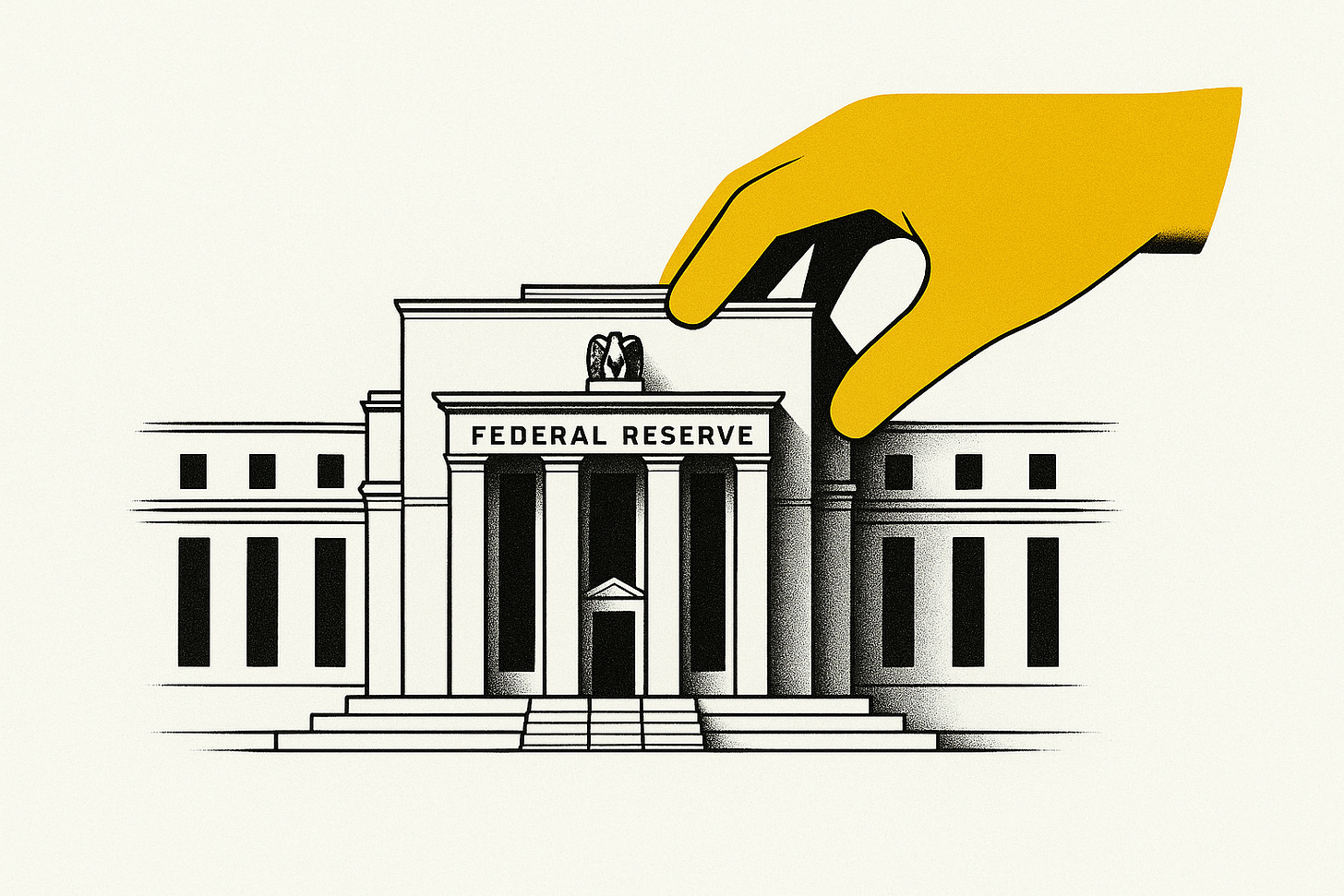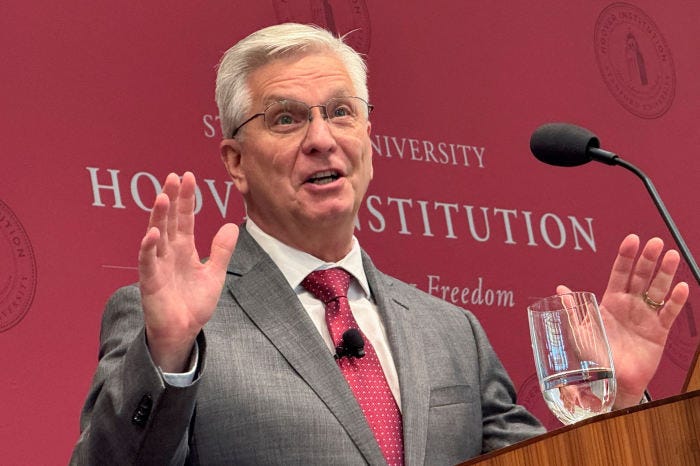The Battle For Fed Independence
Governor Waller threads the Dove needle in the shadow of the President.
Fed Governor Christopher Waller is out today with a full throated endorsement of immediate rate cuts and perhaps even aggressive rate cuts.
Fed’s Waller, a candidate for chair, sees potential for half-point cut if labor weakens.
First lets review his points:
He expects the upcoming August payrolls report to be weak again.
There are signs of a weakening labor market and he worries that conditions could deteriorate rapidly.
He believes it is important for the Fed to be looking at the jobs side of the mandate here as well and be proactive on it and not wait for further labor deterioration and then find themselves in a position of trying to fix a weak labor market rather than trying to prevent one.
The BLS will also be releasing a preview of its annual payroll revision which he said he expects to show on average 60,000 fewer jobs per month than originally reported which would be 720,000 fewer jobs for the year than reported. (Recall that the annual revision last year showed 800,000 fewer jobs than originally reported but was later revised to 600,000 fewer jobs.) He said if it shows this kind of revision, that would mean that the jobs reports from the last 3 months would actually be negative after those revisions.
So what does he think the Fed should be doing:
He currently supports a 25 basis point cut in the Fed Funds rate at the September meeting.
He is open to a potentially larger cut in September if the labor market continues to weaken.
He expects additional cuts over the next three to six months. He does not say how many, but he does say the Fed remains as much as 1.5 percentage points above the neutral level. His view of the neutral level is lower than that of a number of other committee members.
He believes the Fed can and should use its power over interest rates to keep the labor market from weakening further to which he said, “So, let’s get on with it.”
He is clearly one of the more dovish members of the Fed. He thinks the labor side of the Fed’s mandate needs more attention now than the inflation side. This dovetails with my post yesterday about the downsides of getting anchored to an inflation target that overrides a balanced and comprehensive view of all the factors of the economy that play into the Fed’s dual mandate.
That is the interest rate Dove needle that Governor Waller is trying to thread in an environment that has previously been focused on inflation exclusively.
Inflation is clearly a real threat that needs to be taken seriously, but do we really want to continue to choke the economy in an attempt to squeeze out the last few basis points of inflation simply because we are determined to reach an arbitrary target rate that the Fed has held out as the ultimate measure of success? Doing so has consequences for the economy and the job market. If we lose a few percent off of GDP and a few million people lose their jobs, but we get inflation down from 3% to 2% will that be considered a good trade off? For that to be true we would have to argue that 2% inflation is some kind of economic nirvana and 3% inflation is either dangerous for future inflation or oppressive for consumers when compared to 2%. The 1990s and 2000s didn’t seem to present either of those scenarios with respect to inflation even though it ran at about 3% the whole time.
So Waller’s points are all valid (although some are just predictions), but they all have a long dark shadow cast upon them by the ominous presence of a massive pressure campaign on the Fed by the President. All of these discussions are the right types of debates to have. In a normal political environment that is exactly what the debate would be about, and it could happen in an open fashion. However, the current environment casts a cloud over the entire topic of interest rate cuts because everyone is asking themselves if this is a true economic argument or a politically motivated one. This is especially true when certain individuals like Governor Waller are involved since he is both a Trump appointee and a top candidate for future Fed Chair.
Because of the immense and unprecedented pressure The President has continued to put on the Fed to lower interest rates, both the markets and Fed observers are uncertain if members of the Fed are truly operating independently of the pressure from The President.
The President has created this situation by:
Repeatedly arguing that he wants the Fed to lower rates and by as much as 3% which would put them back down near the 1% level they were at after the dot com market crash.
Repeatedly disparaging Chair Powell for not doing what he wanted and threatening to fire him.
Engaging in a dirt digging exercise to try to find cause to fire both chair Powell for cost overruns on the Fed HQ remodel and any other members of the Fed. This has now resulted in a concerted effort to fire Fed Governor Lisa Cook over purportedly inaccurate primary residence information on multiple mortgage applications. It is worth asking how these somewhat minor infractions were discovered in the first place. As I have pointed out many times, unless you commit something egregious no one is looking for such minor infractions. This was a concerted effort to dig up any possible infraction by any Fed member. Was this done to ensure the utmost integrity at the Fed? Just the opposite. The President doesn’t value integrity. He values loyalty over integrity to any objective standard. And not loyalty to the Constitution or to one’s oath but loyalty to him and what he wants. This was not a quest for integrity. This was a witch hunt designed to allow the President to pack the Fed with his loyalists. It is also worth noting that these incidents occurred prior to Cook becoming a Fed Governor but could potentially be considered mortgage fraud if it was done with intent to mislead. Stating an exaggerated income level would be equally considered mortgage fraud. It is unclear if such an action, especially having occurred prior to her becoming a Fed Governor, would meet the legal definition of cause that the President needs to fire a Fed Governor. This is being adjudicated in the courts as we speak.
Talking repeatedly about getting a new chair when Powell’s term is up who will share his view to lower rates at any cost with Governor Waller being one of the people considered to be on the short list which raises questions about whether his position on interest rates is influenced by his desire to meet The President’s expectations about how the next Fed Chair will view the Fed’s role on interest rates.
Talking after his attempt to fire Governor Cook about how he will soon have a majority of Fed Governors on the committee indicating that he certainly does desire and expect Governors that he appoints or has appointed in the past to do his bidding on interest rate policy rather than following their oath to observe the dual mandate.
This has created a dangerous and uncertain environment for the Fed to operate in and for the markets to trust that the Fed truly is going to continue to make decisions independently that they believe are in the long-term best interest of the economy rather than to do the bidding of The President.
Congress and Presidents have expressed disappointment and disapproval of Fed choices my whole life. I have never once felt anyone seriously questioned if the Fed was swayed by such critiques. These efforts by The President are far beyond critiques to include threats of executive action and fear of legal jeopardy by an over active Justice Department operating at the order of the President. In that environment, everyone has at least some question as to whether some members of the Fed are being swayed by those threats and actions.
Governor Waller’s points are valid. The job market does need equal consideration in the dual mandate. He is bringing some attention to that after inflation being the only real consideration for the past 4 years. Unfortunately no one is quite certain that his viewpoint is fully independent from the presidential pressure campaign on the Fed.
There are reasonable arguments for the Fed to lower rates a little from here. Probably not quite as much in the near term as the 1.5% Waller thinks the rate is above neutral and certainly not anywhere near as much as the 3% The President wants.
We need to keep an independent Fed. While we do not have any good data to suggest a 2% inflation target is optimal or even necessary to maintain stable prices, we do have a lot of data on the ability of independent central banks to maintain stable prices and the inability of politically controlled central banks to do so.
The Fed has important economic issues to consider, but the threat to their independence is far more important to the long term economic health and inflation rates that we will experience in the coming years and perhaps even decades. The real battle at the Fed right now is a fight for their very existence as an independent monetary agency. That is a battle we cannot afford for them to lose.




#3 +11111